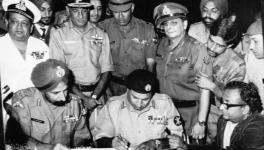In My Own Voice: Grief Has No Borders
Image for representational use only.Image Courtesy: The Indian Express
‘This isn’t surely the dawn we waited for so eagerly
This isn’t surely the dawn with whose desire cradled in our hearts
We had set out, friends all, hoping
We should somewhere find the final destination
Of the stars in the forests of heaven…’
So wrote Faiz Ahmed Faiz about Partition in which 10 million people were displaced, over a million died and innumerable women were raped.
Indeed, it is difficult to write these lines today, gentle reader, for any dissenting voice against war is seen as dishonouring the sacrifice of the armed forces. Truly, the fallen blood on the soil, turning it into a red earth, is being reaped avidly for the machinations of electoral power. The air is filled with the sickening smell of blood, and it would not be appropriate to talk about the trauma inflicted on those who live along the Line of Control, but then what is a writer if she does not place the truth before her people?
The facts always tell us much less of what has actually happened. The people on the border villages of Jammu and Kashmir live under a constant attack of mortar shells and suffer both physical and psychological trauma – on both the sides. Trauma is hard to reveal, define and deal with, as it has no tell-tale marks, but this has been documented by a recent study, ‘Living on the Margins’ by the Centre for Dialogue and Reconciliation.
As we fight over borders, let us remember that Europe once did too, but today they have one currency – Euro – and one passport, as their people can travel and work across Europe, freely; something we in South Asia must aspire.
The International Association of Women in Radio and Television has just started its annual three-day film festival about films made by women and of women. Instead of the manly history determined by war and borders, I applaud the creation of her-story. I have just seen the screening of ‘Displacement’ which is like a hand-crafted patchwork quilt of emotion – a collaborative film based on contributions from Tunisia, Canada, Bangladesh and India, developed by Chandita Mukherjee, Archana Kapoor et al.
This is a disturbing film which succeeds in giving a voice to the marginalised and the voiceless women who have been displaced. It brings you the realities of people who once lived and led happy, contented lives till war and conflict displaced them from their homeland. Meet Haifa Saad, a displaced woman from Syria who had a happy marriage and seven children. She is grateful for her refuge in Tunisia, but she has only two of her seven children with her. The others have been left behind, and her husband was taken away for questioning by a group of men. Her daughter recalls, “The door knocked, and they took him, saying he would be back in a couple of hours.” She pauses, and then says, “It’s been four years now.” It is heart-wrenching. The film shows this brave woman who did not know English, and visited a psychotherapist to deal with her depression, as her life spiralled out of control. He counselled her to go out every day and do something small; she says, ‘each day got a little better’.
Also read: In My Own Voice: Circle of Unreason
There is a Rohingya refugee who was promised marriage, but was sold to an agent who used her for human trafficking. She reveals on camera, “He sold me to 30 men, and they used to beat me up.’ The genocide in Myanmar against the Rohingyas played out on her body, as time and again it has been shown that violence in conflict-ridden areas is always enacted on women’s bodies. Women and children are the most vulnerable. Now she lives in Mewat, Haryana, but reveals that even here, ‘men bang on her door and try to break in’. Instead of acceptance and refuge, she is branded as a prostitute, as she tries bravely to earn a respectable living, and raise her two children as a single mother.
Then, there is a 94-year-old Filipino woman leader, who reveals how she and her people were forcibly ousted from their village by the military. ‘The surveyors were backed by the soldiers who wanted to build a dam. When soldiers come, there is always trouble.’ There is a clip of President Duarte, where he says, ‘I will bomb your schools. You are teaching your children to rebel against the government.’ The effect, gentle reader, is terrifying!
I remember visiting Pararia in the Santhal Parganas area where the women had been gang-raped by the police. Walking around the area, I came across an unfinished dam. The villagers had been protesting against the dam as it would displace them. The police broke into their homes at night, and raped the women to finish the unfinished business – to teach them a lesson.
War, conflict and a violent model of development are creating refugees, and one out of every 110 people is a refugee. There are 165 million people who are traumatised, suffering refugees in the world, today.
We have had an almost four-decade-long non-violent struggle by the Narmada Bachao Andolan against the displacement of villagers, ousting them from their generations old homeland and sending them out as refugees.
Over the years, I have made several visits to the Narmada valley, and found not only their traditional lifestyle to be peaceful and sustainable, but the so-called ‘rehabilitation centres’ to be foul tin-sheds on low-lying land, where no cultivation is possible. Worse, fisher-folk and potters, who live off the river and its rich alluvial soil, are not even counted as ‘displaced’; this exalted title goes to those who own land, and have ‘pattas’ (records) to prove it.
This government has been brutal about raising the height of the Sardar Sarovar dam, and showing its might against the people protesting non-violently and offering a jal-satyagraha by sending in truck-loads of the police.
If it continues to flex its arms, and focus on a military solution for Kashmir instead of getting the world on board and coming to a peaceful solution – with some give and take – we might find ourselves in a worse situation than the women who have bared their souls above, because, gentle reader, grief has no borders.
Author is an award-winning author and a film-director. Views expressed are personal.
Also read: In My Own Voice: Kashmiriyat
Get the latest reports & analysis with people's perspective on Protests, movements & deep analytical videos, discussions of the current affairs in your Telegram app. Subscribe to NewsClick's Telegram channel & get Real-Time updates on stories, as they get published on our website.
























